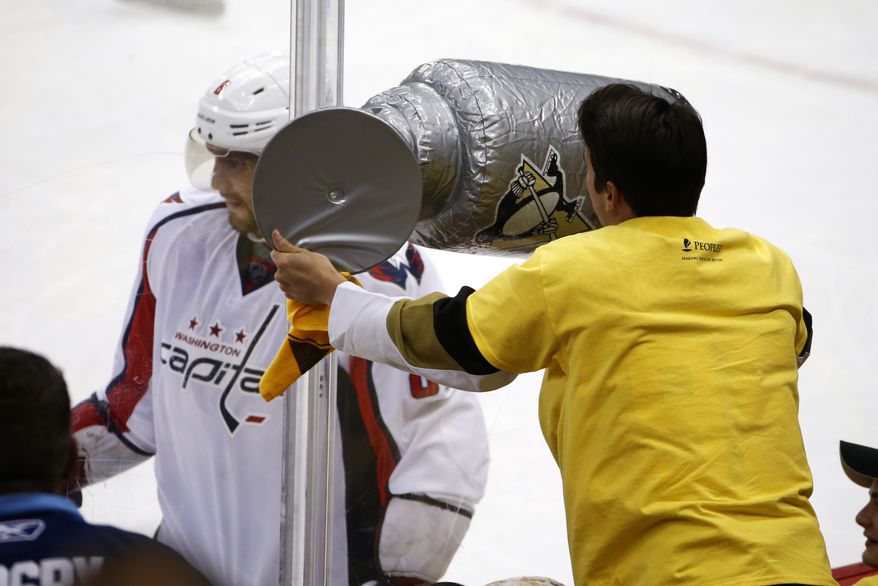- The Washington Times - Thursday, May 5, 2016

A Pittsburgh Penguins fan waves an inflatable Stanley Cup at Washington Capitals' Alex Ovechkin, left, during the third period of Game 4 in an NHL hockey Stanley Cup Eastern Conference semifinals in Pittsburgh, Wednesday, May 4, 2016. (AP Photo/Gene J. Puskar)
“That’s why it’s sudden death. That’s what it feels like.”
— Barry Trotz, Washington Capitals coach
— Barry Trotz, Washington Capitals coach
No, Coach. That’s not what it feels like. It’s a slow death — one that starts with the opening of every Capitals season and then ends in Stanley Cup Playoffs failure.
Worse, Coach, it is like Groundhog Day, because it happens every year.
Sudden death? Hardly.
Sudden death? Hardly.
The Capitals, in a game in which Redskins coach Jay Gruden might have called a “Code Red,” continued their “code blue” lifeless play in a 3-2 overtime loss to the Pittsburgh Penguins in Game 4 of the Eastern Conference semifinals on Wednesday night.
The victory gives the Penguins a 3-1 lead, with Game 5 on Saturday night at Verizon Center.
Who knows? Maybe the Capitals will be desperate enough to play their best game of the playoffs before the home crowd and force a Game 6 back in Pittsburgh.
We keep hearing from Trotz that his team hasn’t played its best game in these playoffs. What are they saving it for — next season’s Russian Heritage Night and another Alex Ovechkin milestone celebration?
Here you have a team that, by its coach’s own admission, has not played its best. A team with players who, by their own admission, have played with a lack of desperation. A team that was handed an opportunity, with the one-game suspension of Pittsburgh’s valuable defenseman Kris Letang, to take advantage of a weakened Penguins team and even the series at 2-2, giving it home-ice advantage again in a two-out-of-three series finale.
And yet there were large stretches of Wednesday night’s game when theCapitals played with that disturbing lack of urgency that has become this franchise’s postseason identity during the Ovechkin era.
I can’t stop thinking about something the great New York Rangers goaltender Henrik Lundqvist once said about what it takes for playoff success — something that I referred to in my column on Wednesday about the pattern of offensive woes in the Capitals‘ playoff history.
“A lot of these games, it comes down to will,” Lundqvist said last year. “How badly do you want it? Teams are so even that it comes down to a battle in the corner, in front of the net, all over the ice. It’s one-on-one battles against your opponent. If you want it bad enough, I think you’re going to have a good chance.”
He said this after the Rangers came back from a 3-1 series deficit to defeat the Capitals in seven games.
There’s been little evidence of that “will” from the Capitals this postseason. In fact, if you go back to previous playoffs since 2009 — Ovechkin’s first postseason — you would be hard pressed to find many performances that meet that standard.
The closest the Capitals have come to doing “battle in the corner, in front of the net, all over the ice?” The team coached in 2012 by Dale Hunter — the time when Ovechkin’s greatest skills were marginalized.
That group failed to get any farther than any of the other Capitals playoff teams since 2009, exiting in seven games in the second round to the Rangers. But no one ever used the words “lack of urgency” or “lack of desperation” to describe that unit.
The National Post, one of Canada’s largest newspapers, wrote then of Hunter’s coaching style — and its results:
“He reduced the ice time of the team’s stars, created less puck possession for his team, and produced more time in Washington’s defensive end. He has carved out increased roles for of a posse of grinding pros like Jay Beagle, Joel Ward, Jason Chimera, Troy Brouwer, Mike Knuble, and especially in Game 6 in Washington, Matt Hendricks. Hendricks, a guy who bounced around for years, is a perfect Capital, just now.
“‘Cause he’s a — I don’t know if I can say it — he’s a prick on the ice,’ Brooks Laich says of Hendricks. ‘You don’t want to play against a guy like that. You have to go through a lot to get the best of Matt Hendricks. He’s going to compete, and he’s going to do everything in his power to not let you do it.’”
This team?
“We’ve just got to make sure we’re in full desperation mode from the drop of the puck next game,” defenseman Taylor Chorney said after Wednesday’s overtime loss.
Or they could just save it for Russian Heritage Night.


No comments:
Post a Comment